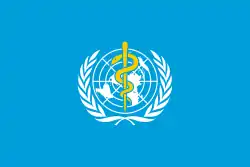國際衛生條例
《國際衛生條例》(法語:;英語: , 缩写)是一個控制傳染病在全球蔓延的國際條約,目前由世界衛生組織管理,並由其193個成員國所遵守。
 | |
| 簽署日 | 2005年5月23日 |
|---|---|
| 簽署地點 | 联合国 |
| 生效日 | 2007年6月15日 |
| 簽署者 | |
| 保存處 | 联合国 |
| 語言 | 法语、英语 |
| 收錄於维基文库的條約原文 | |
摘要
《國際衛生條例》主要是規定遵守協議的國家,需要為嚴重傳播病的爆發向世界衛生組織進行通報。過往的通報範圍只適用於霍亂、黃熱病和鼠疫等,但2007年6月15日生效的新修訂,已要求擴大通報範圍至任何新發現的傳染病及輻射、化學引發的事件。[1]
相關事件
- 2009年 H1N1豬流感大流行
- 2014年 全球消滅脊灰工作的挫折
- 2013-2016年 西非埃博拉病毒流行
- 2016年 寨卡病毒爆發
- 2018-2019年 基伍埃博拉疫情
- 2019-2022年 COVID-19 大流行
參考資料
- Art. 2, IHR (2005)
外部連結
| 您可以在維基文庫中查找此百科條目的相關原始文獻: |
- International Health Regulations (1969) (页面存档备份,存于). Third Annotated Edition, WHO, 1983
- International Health Regulations (2005) (页面存档备份,存于). WHO. Geneva. 2006
- World Health Organization, Communicable Diseases Surveillance and Response, Epidemic and Pandemic Alert and Response Frequently Asked Questions about International Health Regulations (页面存档备份,存于)
- IHR 2005: From the Global to the Local
- Lawrence O. Gostin, International Infectious Disease Law, Revision of the World Health Organization’s International Health Regulations, Journal of the American Medical Association, June 2, 2004, at 2623.
This article is issued from Wikipedia. The text is licensed under Creative Commons - Attribution - Sharealike. Additional terms may apply for the media files.